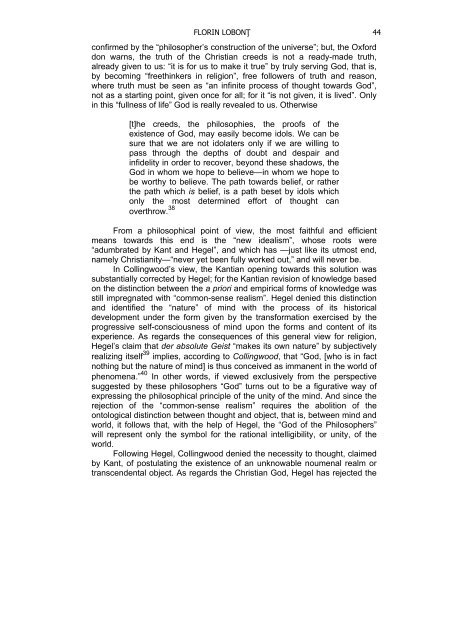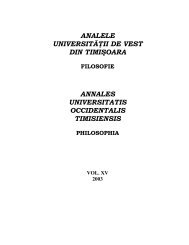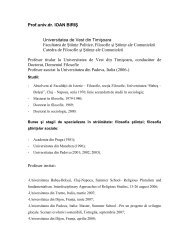VOL. IV (XXI) 2009 - Departamentul de Filosofie si Stiinte ale ...
VOL. IV (XXI) 2009 - Departamentul de Filosofie si Stiinte ale ...
VOL. IV (XXI) 2009 - Departamentul de Filosofie si Stiinte ale ...
Create successful ePaper yourself
Turn your PDF publications into a flip-book with our unique Google optimized e-Paper software.
FLORIN LOBONŢ 44<br />
confirmed by the “philosopher’s construction of the universe”; but, the Oxford<br />
don warns, the truth of the Christian creeds is not a ready-ma<strong>de</strong> truth,<br />
already given to us: “it is for us to make it true” by truly serving God, that is,<br />
by becoming “freethinkers in religion”, free followers of truth and reason,<br />
where truth must be seen as “an infinite process of thought towards God”,<br />
not as a starting point, given once for all; for it “is not given, it is lived”. Only<br />
in this “fullness of life” God is really reve<strong>ale</strong>d to us. Otherwise<br />
[t]he creeds, the philosophies, the proofs of the<br />
existence of God, may ea<strong>si</strong>ly become idols. We can be<br />
sure that we are not idolaters only if we are willing to<br />
pass through the <strong>de</strong>pths of doubt and <strong>de</strong>spair and<br />
infi<strong>de</strong>lity in or<strong>de</strong>r to recover, beyond these shadows, the<br />
God in whom we hope to believe—in whom we hope to<br />
be worthy to believe. The path towards belief, or rather<br />
the path which is belief, is a path beset by idols which<br />
only the most <strong>de</strong>termined effort of thought can<br />
overthrow. 38<br />
From a philosophical point of view, the most faithful and efficient<br />
means towards this end is the “new i<strong>de</strong>alism”, whose roots were<br />
“adumbrated by Kant and Hegel”, and which has —just like its utmost end,<br />
namely Christianity—“never yet been fully worked out,” and will never be.<br />
In Collingwood’s view, the Kantian opening towards this solution was<br />
substantially corrected by Hegel; for the Kantian revi<strong>si</strong>on of knowledge based<br />
on the distinction between the a priori and empirical forms of knowledge was<br />
still impregnated with “common-sense realism”. Hegel <strong>de</strong>nied this distinction<br />
and i<strong>de</strong>ntified the “nature” of mind with the process of its historical<br />
<strong>de</strong>velopment un<strong>de</strong>r the form given by the transformation exercised by the<br />
progres<strong>si</strong>ve self-consciousness of mind upon the forms and content of its<br />
experience. As regards the consequences of this general view for religion,<br />
Hegel’s claim that <strong>de</strong>r absolute Geist “makes its own nature” by subjectively<br />
realizing itself 39 implies, according to Collingwood, that “God, [who is in fact<br />
nothing but the nature of mind] is thus conceived as immanent in the world of<br />
phenomena.” 40 In other words, if viewed exclu<strong>si</strong>vely from the perspective<br />
suggested by these philosophers “God” turns out to be a figurative way of<br />
expres<strong>si</strong>ng the philosophical principle of the unity of the mind. And <strong>si</strong>nce the<br />
rejection of the “common-sense realism” requires the abolition of the<br />
ontological distinction between thought and object, that is, between mind and<br />
world, it follows that, with the help of Hegel, the “God of the Philosophers”<br />
will represent only the symbol for the rational intelligibility, or unity, of the<br />
world.<br />
Following Hegel, Collingwood <strong>de</strong>nied the neces<strong>si</strong>ty to thought, claimed<br />
by Kant, of postulating the existence of an unknowable noumenal realm or<br />
transcen<strong>de</strong>ntal object. As regards the Christian God, Hegel has rejected the




